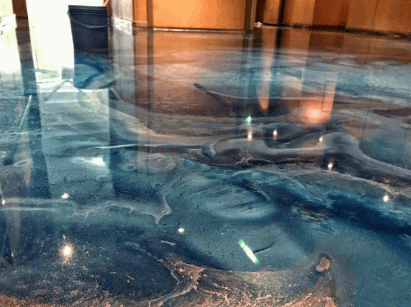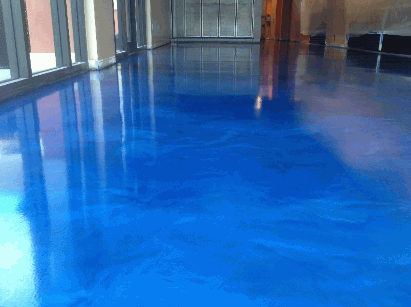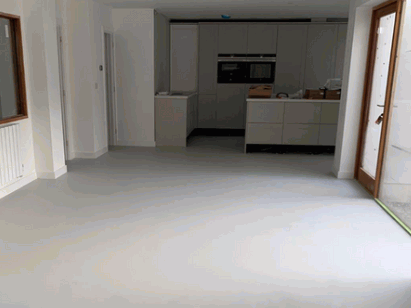Contents
Resin floors have become increasingly popular in recent years due to their durability, easy maintenance, and versatility.
We will explore the different types of resin floors available, such as epoxy, polyurethane, acrylic, and methyl methacrylate (MMA).
The benefits of resin floors, including their chemical resistance, will be discussed.
We will delve into the factors that affect the cost of resin floor installation and provide tips on how to save money on this type of flooring.
Whether you are considering a resin floor for your home or business, this article will provide you with valuable information to help you make an informed decision.

What Is A Resin Floor?
Resin flooring is a popular choice for homeowners and commercial spaces due to its durability, design versatility, and easy maintenance. These floors are created using various types of resin materials, offering a seamless and attractive finish to any space.
One of the key benefits of resin flooring is its exceptional durability, making it ideal for high-traffic areas that require a long-lasting flooring solution.
The design versatility of resin flooring allows for endless customisation options, from bold colours to intricate designs, enabling individuals to create unique spaces that reflect their style.
Along with its aesthetic appeal, resin flooring is also highly practical, as it is easy to clean and maintain, requiring minimal effort to keep it looking as good as new.

What Are The Different Types Of Resin Floors?
Resin floors come in various types, such as Epoxy, Polyurethane, Acrylic, and Methyl Methacrylate (MMA), each offering distinct properties and designs. Suppliers like Isabel Dennis and Sphere8 provide different resin flooring systems tailored to specific needs and preferences.
Epoxy resin floors are known for their high durability and chemical resistance, making them ideal for industrial settings like warehouses and factories. They are available in a wide range of colours and finishes, allowing for customisable designs to suit various aesthetics.
Polyurethane resin floors, on the other hand, offer excellent abrasion resistance and are often used in commercial spaces due to their easy maintenance and seamless finish. These floors can withstand heavy foot traffic and are available in matte or gloss options.
Epoxy Resin Floors
Epoxy resin floors are known for their high durability and strength, making them ideal for high-traffic areas. The EconoSphere system by Natasha offers a cost-effective epoxy flooring solution with multiple layers for added protection and longevity.
These floors are not only tough but also highly resistant to chemicals, stains, and impacts, making them perfect for industrial and commercial spaces. The installation process involves meticulous surface preparation to ensure a strong bond between the existing floor and the epoxy resin layers. The system components typically include epoxy resin, hardener, and aggregate, which are mixed on-site and applied in an even coat.
Various types of epoxy resin floors are available, ranging from self-levelling epoxy to decorative metallic epoxy, catering to different aesthetic preferences and functional requirements. The versatility of epoxy flooring allows for customisation in terms of colours, patterns, and finishes, ensuring that every project is unique.
Learn more: Can You Put Resin On Wood Floors

Polyurethane Resin Floors
Polyurethane resin floors offer excellent durability and chemical resistance, making them suitable for a wide range of applications. Homeowners in Kent often choose Polyurethane floors for their easy maintenance and long-term performance.
One of the key benefits of Polyurethane resin flooring is its seamless surface, which not only enhances the aesthetics of a space but also prevents the accumulation of dirt and bacteria, making it easy to clean and maintain.
The durability of Polyurethane floors is ideal for high-traffic areas like commercial kitchens and workshops, where heavy machinery and constant foot traffic can take a toll on traditional flooring materials.
In addition, the chemical resistance of Polyurethane resin floors makes them perfect for environments that require resistance to oils, grease, and other harsh chemicals, such as industrial facilities and laboratories.

Acrylic Resin Floors
Acrylic resin floors offer a wide range of design possibilities with customisable colours, patterns, and effects. The brecciaSphere system from Sphere8 provides innovative Acrylic resin solutions for unique and stylish flooring designs.
The flexibility of Acrylic resin floors allows homeowners and designers to create visually stunning spaces that reflect their individual styles and preferences. From sleek and modern monochromatic designs to bold and vibrant patterns, Acrylic resin flooring offers endless aesthetic options to suit any interior décor.

What Are The Benefits Of Resin Floors?
Resin floors offer numerous benefits, including exceptional durability, easy maintenance, design versatility, and chemical resistance. These features make them a popular choice for both residential and commercial spaces.
One of the key advantages of resin flooring is its incredible durability it can withstand heavy foot traffic and daily wear and tear without losing its appeal. This durability not only ensures a long-lasting investment but also reduces the need for frequent repairs or replacements, saving time and money in the long run.
Durability
One of the key benefits of resin flooring is its exceptional durability, ensuring longevity and wear resistance even in high-traffic areas. The use of quality materials like Polyurethane and Epoxy contributes to the long-lasting performance of resin floors.
Resin floors are known for their ability to withstand heavy foot traffic and frequent use without showing signs of wear and tear. This durability makes them ideal for commercial spaces, industrial facilities, and even residential areas prone to high activity. The application of Polyurethane and Epoxy in resin flooring not only provides a protective layer but also enhances its overall strength, making it highly resistant to scratches, stains, and chemical damage.
Easy Maintenance
Resin floors are known for their easy maintenance requirements, requiring simple cleaning routines to keep them looking fresh and new. Regular sweeping and occasional mopping are usually sufficient to maintain the appearance of resin floors.
One of the key advantages of resin flooring is its ability to resist stains and water damage. This makes cleaning spills a breeze, as they can simply be wiped away with a damp cloth. The smooth surface of resin floors makes them easy to sweep, preventing the build-up of dirt and debris.
For deeper cleaning, a gentle pH-neutral cleaner can be used with warm water. Avoid harsh chemicals or abrasive cleaners, as they can damage the resin finish. By following these simple maintenance practices, resin floors can retain their lustre and durability for years to come.
Versatility
Resin floors offer great versatility in design, allowing for customised colours, patterns, and effects to suit any interior style. Homeowners can choose from a wide range of design options to create unique and personalised flooring solutions.
The beauty of resin flooring lies in its ability to mimic various materials like marble, granite, or even metallic surfaces, offering a sophisticated aesthetic appeal. With seamless application, these floors provide a sleek and modern look that enhances any space. Whether you prefer a minimalist Scandinavian design or a bold industrial style, resin floors can be tailored to complement your chosen interior theme perfectly. The durability and easy maintenance of resin floors make them a practical and stylish choice for any home.
Chemical Resistance
Resin floors exhibit excellent chemical resistance, making them ideal for spaces where exposure to various chemicals is a concern.
The properties of resin materials like Polyurethane and PMMA contribute significantly to the resistance against chemical damage.
Polyurethane, a popular choice for resin flooring, forms a durable protective layer that shields the floor against harsh chemicals.
PMMA, on the other hand, boasts exceptional resistance to acids, alkalis, and solvents, ensuring the longevity and durability of the resin floors in industrial settings.

How Much Does A Resin Floor Cost?
The cost of a resin floor can vary based on several factors, including the type of resin used, the dimensions of the area, and any additional design features like metallic effects. Homeowners can request quotes from suppliers like Natasha and Sphere8 to get an accurate estimate of the total cost.
When considering the pricing of resin flooring, the resin type plays a crucial role in determining the overall costs. Epoxy resin, polyurethane resin, and polyaspartic resin are common options with varying price points.
- The dimensions of the space to be covered also impact pricing, as larger areas require more material and labour.
- Special design elements, such as intricate patterns or metallic finishes, can add a premium cost to the project.
Suppliers like Natasha and Sphere8 have expertise in providing tailored quotes based on these specific factors, ensuring homeowners have a clear understanding of the expenses involved.
Factors That Affect The Cost
Several factors can impact the cost of resin flooring, including the location of the installation, the amount of preparatory work required, and any cost reduction strategies employed. Proper planning and budgeting are essential to manage costs effectively.
Location plays a crucial role in determining the overall cost of resin flooring, as prices can vary based on geographical factors and accessibility to materials.
The extent of prep work needed, such as surface preparation and repairs, can significantly influence the total expenses involved.
Cost reduction techniques, like bulk purchasing or choosing less expensive materials, can help in cutting down the project costs without compromising on quality.

Average Cost Of Different Types Of Resin Floors
The average cost of resin floors varies depending on the type chosen, with Epoxy floors generally being more cost-effective compared to other options. Understanding the cost implications of different resin flooring types can help homeowners make informed decisions about their installations.
For example, when comparing Epoxy floors to Polyurethane floors, Epoxy typically has a lower material cost due to its composition. On the other hand, Polyurethane floors might require additional coatings or finishes, increasing the overall installation expenses.
When assessing the overall cost-effectiveness of resin floors, it’s crucial to consider not only the initial cost but also the long-term maintenance requirements. Epoxy floors, known for their durability and resistance to chemicals and abrasion, often result in lower maintenance costs over time.
How To Save Money On Resin Floor Installation?
Homeowners can explore several strategies to save money on resin floor installation, such as obtaining multiple quotes from different suppliers, opting for cost-effective sealants and coatings, and considering DIY options for simpler installations.
When seeking quotes, it’s important for homeowners to be clear about their requirements and discuss any customisation options that could affect the overall cost. Additionally, cost-effective sealants and coatings play a vital role in ensuring the durability and longevity of the resin floor. By carefully selecting these products, homeowners can ensure that their investment lasts for years to come without the need for frequent repairs or replacements.

Get Multiple Quotes
Obtaining multiple quotes from different resin flooring suppliers is essential to compare pricing, services offered, and overall value. Homeowners should request detailed quotes that include all installation costs and material expenses for an accurate cost assessment.
Comparing quotes allows homeowners to ensure they are getting the best deal for their resin floor installation project. It’s not just about the cost but also about the quality of materials, the reputation of the supplier, and the level of customer service provided.
By gathering several quotes, individuals can assess the market rates, identify any hidden charges, and make an informed decision. Looking for guarantees, warranties, and after-sales support in the quotes can help determine the overall value proposition offered by each supplier.
Taking the time to analyse and compare quotes can lead to a successful resin flooring installation that meets both budget and quality expectations.
Choose A Reputable Contractor
Selecting a reputable contractor for resin floor installation is crucial to ensure quality workmanship and a smooth installation process. Homeowners should research potential contractors, check reviews, and verify credentials before making a hiring decision.
One of the key factors to consider when choosing a contractor for your resin flooring project is their level of experience and expertise in handling such installations. A professional contractor with years of experience will have the skills and knowledge to tackle any challenges that may arise during the installation process. Homeowners should inquire about the types of materials and tools the contractor plans to use, ensuring they are of high quality and suitable for the job.
Consider DIY Options
For cost-conscious homeowners, exploring DIY options for resin floor installations can be a viable solution. DIY kits and materials are available for simpler projects, allowing homeowners to save on installation costs and personalise their flooring design.
- Start by preparing the existing floor surface by cleaning and levelling it.
- Follow the manufacturer’s instructions carefully when mixing and applying the resin.
- Ensure proper ventilation during the installation process for safety.
- Consider experimenting with different colours or patterns to create a unique flooring design.
When considering a DIY resin floor project, it is crucial to measure the space accurately and plan the layout beforehand. DIY resin flooring installations can be a rewarding and cost-effective way to upgrade your home’s interior.
Opt for Lower Cost Resin Materials
Choosing lower-cost resin materials can help homeowners reduce overall expenses without compromising on quality.
Resin flooring comes in various types such as epoxy, polyurethane, and acrylic, each with its own set of advantages and characteristics. Epoxy resin, known for its durability, is a popular choice for high-traffic areas. On the other hand, polyurethane resin offers excellent UV resistance, making it ideal for outdoor applications. Acrylic resin, while less durable, provides a cost-effective solution for light-duty use.
By weighing the cost versus quality aspects of these materials, homeowners can achieve a balance that meets their specific needs. Lower-cost resin materials can be a cost-efficient option for those looking to achieve a quality finish without overspending.
